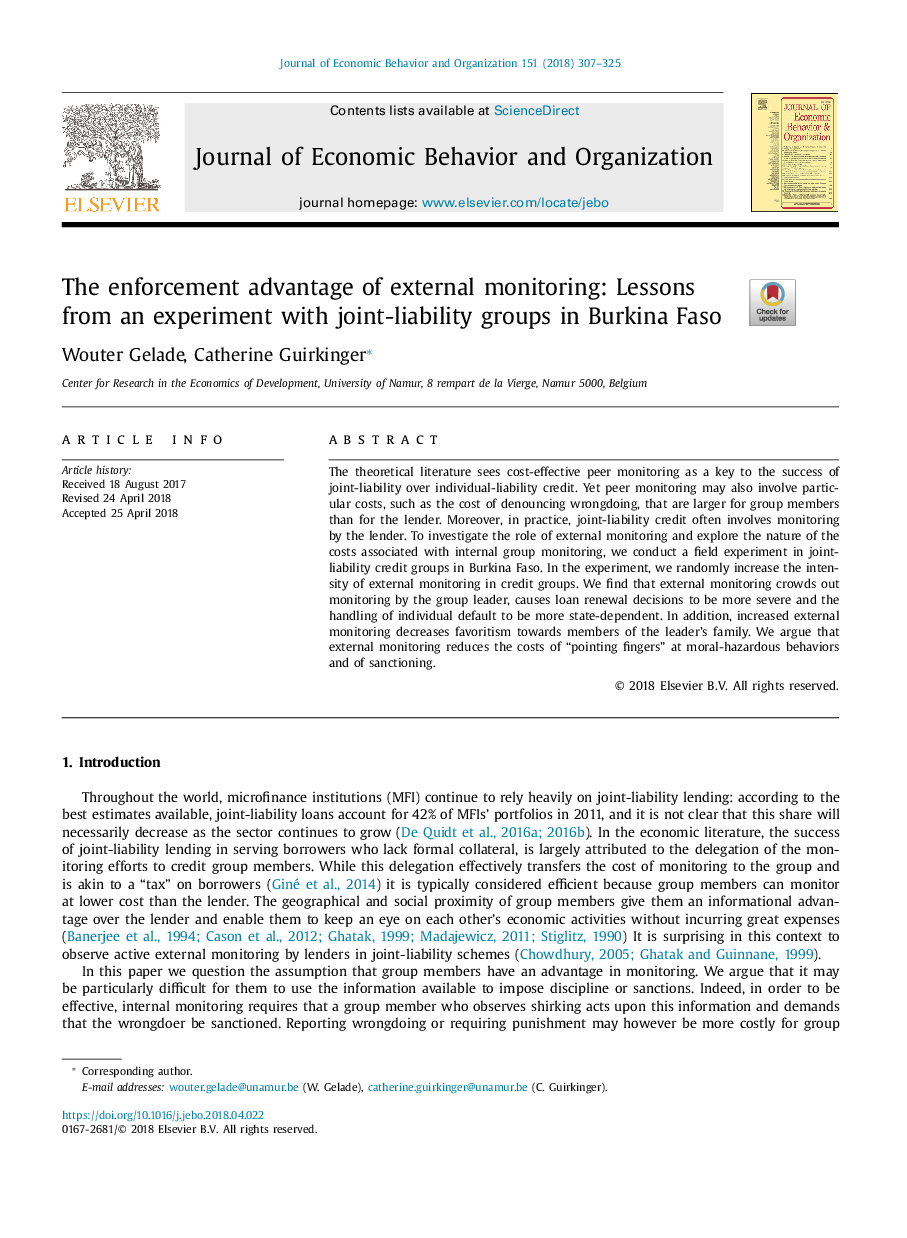| کد مقاله | کد نشریه | سال انتشار | مقاله انگلیسی | نسخه تمام متن |
|---|---|---|---|---|
| 7242490 | 1471616 | 2018 | 19 صفحه PDF | دانلود رایگان |
عنوان انگلیسی مقاله ISI
The enforcement advantage of external monitoring: Lessons from an experiment with joint-liability groups in Burkina Faso
ترجمه فارسی عنوان
مزیت اجرایی نظارت خارجی: درس هایی از یک آزمایش با گروه های مسئولیت مشترک در بورکینافاسو
دانلود مقاله + سفارش ترجمه
دانلود مقاله ISI انگلیسی
رایگان برای ایرانیان
ترجمه چکیده
در ادبیات نظری، نظارت بر نظارت بر هزینه های موثر، به عنوان کلید موفقیت موفقیت مشترک از بدهی های فردی-مسئولیت پذیری است. با این وجود نظارت همکار ممکن است شامل هزینه های خاصی نظیر هزینه هتک حرمت، که برای اعضای گروه بزرگتر از وام دهنده است. علاوه بر این، در عمل، اعتبار مشترک اعتباری اغلب شامل نظارت بر وام دهنده می شود. برای بررسی نقش نظارت خارجی و کشف ماهیت هزینه های مرتبط با نظارت گروه های داخلی، ما یک آزمایش میدانی در گروه های اعتباری مشترک در بورکینافاسو انجام می دهیم. در آزمایش، به طور تصادفی افزایش شدت نظارت خارجی در گروه های اعتباری افزایش می یابد. ما می بینیم که نظارت های خارجی مانع از نظارت رهبر گروه می شود، تصمیمات تمدید وام را شدیدتر می کند و دستیابی به پیش فرض های فردی بیشتر وابسته به دولت است. علاوه بر این، نظارت بر نظارت خارجی باعث کاهش علاقه به اعضای خانواده رهبر می شود. ما استدلال می کنیم که نظارت خارجی هزینه های یک انگشت اشاره را کاهش می دهد در رفتار اخلاقی خطرناک و تحریم.
موضوعات مرتبط
علوم انسانی و اجتماعی
اقتصاد، اقتصادسنجی و امور مالی
اقتصاد و اقتصادسنجی
چکیده انگلیسی
The theoretical literature sees cost-effective peer monitoring as a key to the success of joint-liability over individual-liability credit. Yet peer monitoring may also involve particular costs, such as the cost of denouncing wrongdoing, that are larger for group members than for the lender. Moreover, in practice, joint-liability credit often involves monitoring by the lender. To investigate the role of external monitoring and explore the nature of the costs associated with internal group monitoring, we conduct a field experiment in joint-liability credit groups in Burkina Faso. In the experiment, we randomly increase the intensity of external monitoring in credit groups. We find that external monitoring crowds out monitoring by the group leader, causes loan renewal decisions to be more severe and the handling of individual default to be more state-dependent. In addition, increased external monitoring decreases favoritism towards members of the leader's family. We argue that external monitoring reduces the costs of “pointing fingers” at moral-hazardous behaviors and of sanctioning.
ناشر
Database: Elsevier - ScienceDirect (ساینس دایرکت)
Journal: Journal of Economic Behavior & Organization - Volume 151, July 2018, Pages 307-325
Journal: Journal of Economic Behavior & Organization - Volume 151, July 2018, Pages 307-325
نویسندگان
Wouter Gelade, Catherine Guirkinger,
